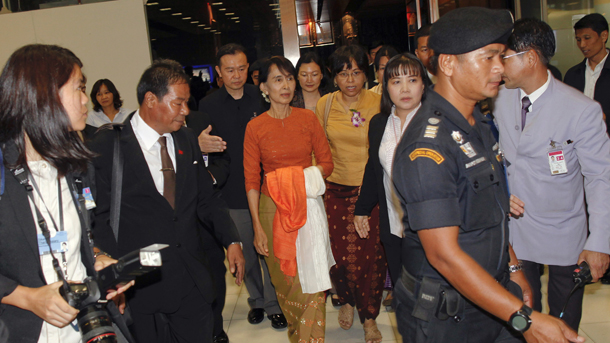MAHACHAI, Thailand—Burmese opposition leader Aung San Suu Kyi on Wednesday used her first trip abroad in nearly a quarter-century to visit impoverished migrants whose flight to neighboring Thailand is emblematic of the devastation wrought on her homeland by decades of misrule.
Fixing a battered economy is one of the most crucial challenges facing Burma, officially known as Myanmar, as it opens up in the wake of 49 years of military governance that ended only last year.
Suu Kyi’s arrival in Bangkok late on Tuesday offered proof of how confident the Nobel Peace Prize laureate is in the nation’s new reformist leaders. She spent 15 of the last 24 years under house arrest, daring not to leave even to visit her dying husband because she was so fearful that the nation’s army rulers would not allow her to return.
Now, in a sign of how much life there has changed, the democracy activist and newly elected member of Parliament is traveling across Thailand, comfortable in the notion she’ll be able to go back home.
On Wednesday, Suu Kyi was expected to visit Mahachai, a town about 20 miles southwest of Bangkok that is home to the largest population of Burmese migrants in Thailand. The Southeast Asian kingdom hosts around 2.5 million impoverished Burmese who have fled here to work low-skilled jobs as domestic servants or in manual labor industries like fisheries and the garment sector.
Andy Hall, a migrant expert and researcher at the Institute for Population and Social Research at Thailand’s Mahidol University, said the migrants—up to a million of them undocumented—make up between five and 10 percent of the Thai work force, contributing as much as seven percent of the nation’s GDP.
Many of them are exploited and paid reduced wages; some have been trafficked; some have had their passports confiscated by employers. Hall said they were nevertheless “the lifeblood of a lot of the Myanmar economy, sending home money to support families who don’t have enough money to eat.”
“They have no voice, they can never speak up or stand up,” Hall said. “So for Aung San Suu Kyi to visit is like a dream come true, someone who finally may be able to bring attention to their suffering.”
Suu Kyi’s visit to Thailand this week will also see her speak at the World Economic Forum on East Asia. She’ll return to Myanmar briefly and then head to Europe, where she’ll address Britain’s Parliament and travel to Oslo, Norway, to formally accept the Nobel Peace Prize she won 21 years ago.
World in 1988 When Suu Kyi Last Left Burma
The world was a different place the last time Aung San Suu Kyi left Burma. The Berlin Wall and the Soviet Union still existed. Bangkok, the city Suu Kyi visits this week, now has towering skyscrapers, a subway and elevated rail system and slightly milder traffic jams.
Elsewhere in 1988:
— Panama leader Gen. Manuel Antonio Noriega was indicted in the United States on drug smuggling charges.
— Prozac was introduced to the US market and quickly became a leading treatment for depression.
— Ben Johnson won the 100m gold at the Seoul Summer Olympics and was later disqualified for taking a steroid.
— The Oscar for best picture went to “The Last Emperor,” directed by Bernardo Bertolucci.
— George Michael’s song “Faith” was the No. 1 song on Billboard’s year-end chart.
— President Ronald Reagan was ending a second term and George H.W. Bush was elected to the White House.
— The Iran-Iraq War—also known as the First Persian Gulf War—ended after eight years.
— The first trans-Atlantic fiber optic cable was laid with capacity to carry 40,000 telephone calls simultaneously.
— A Libyan terrorist attack on Pan Am Flight 103 killed 270 people over Lockerbie, Scotland.















